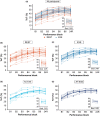Aerobic exercise and aerobic fitness level do not modify motor learning
- PMID: 33686100
- PMCID: PMC7970889
- DOI: 10.1038/s41598-021-84764-y
Aerobic exercise and aerobic fitness level do not modify motor learning
Abstract
Motor learning may be enhanced when a single session of aerobic exercise is performed immediately before or after motor skill practice. Most research to date has focused on aerobically trained (AT) individuals, but it is unknown if aerobically untrained (AU) individuals would equally benefit. We aimed to: (a) replicate previous studies and determine the effect of rest (REST) versus exercise (EXE) on motor skill retention, and (b) explore the effect of aerobic fitness level (AU, AT), assessed by peak oxygen uptake (VO2peak), on motor skill retention after exercise. Forty-four participants (20-29 years) practiced a visuomotor tracking task (acquisition), immediately followed by 25-min of high-intensity cycling or rest. Twenty-four hours after acquisition, participants completed a motor skill retention test. REST and EXE groups significantly improved motor skill performance during acquisition [F(3.17, 133.22) = 269.13, P = 0.001], but had no group differences in motor skill retention across time. AU-exercise (VO2peak = 31.6 ± 4.2 ml kg-1 min-1) and AT-exercise (VO2peak = 51.5 ± 7.6 ml kg-1 min-1) groups significantly improved motor skill performance during acquisition [F(3.07, 61.44) = 155.95, P = 0.001], but had no group differences in motor skill retention across time. Therefore, exercise or aerobic fitness level did not modify motor skill retention.
Conflict of interest statement
The authors declare no competing interests.
Figures





References
-
- Schmidt RA, Lee T. Motor Control and Learning: A Behavioral Emphasis. Human Kinetics; 2011.
-
- Mang CS, Snow NJ, Campbell KL, Ross CJ, Boyd LA. A single bout of high-intensity aerobic exercise facilitates response to paired associative stimulation and promotes sequence-specific implicit motor learning. J. Appl. Physiol. 2014;1985(117):1325–1336. doi: 10.1152/japplphysiol.00498.2014. - DOI - PMC - PubMed
Publication types
MeSH terms
LinkOut - more resources
Full Text Sources
Other Literature Sources
Medical
Miscellaneous

